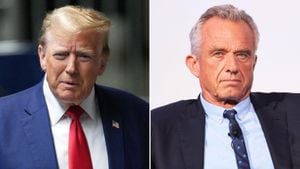India's Places of Worship Act of 1991, which safeguards the religious character of places of worship as they existed on August 15, 1947, has come under intense scrutiny, particularly amid rising concerns about attacks on minority religious sites. Recent discussions within the Lok Sabha, Parliament's lower house, have brought to light the tensions surrounding the Act, highlighting the voices of various MPs who fear for the future of minority places of worship.
Shiv Sena (Shinde)’s Naresh Mhaske called attention to the troubling conditions faced by Hindus and other minorities in Bangladesh, asserting, "The atrocities against the Hindus in Bangladesh cannot be merely termed as an internal issue of the neighbouring country." Mhaske urged the Indian government to take decisive action, seeking accountability from Bangladesh for its treatment of religious minorities. His sentiment echoed through the discussions, alongside the demands for government intervention articulated by Trinamool Congress MP Sudip Bandyopadhyay, who emphasized the urgency for the External Affairs Minister or Prime Minister to address the grave situation of minorities.
While the plight of minorities abroad occupied significant space in the debate, the internal concerns tied to the Places of Worship Act were equally pressing. AIMIM MP, Owaisi articulated strong concerns about recent legal challenges faced by minority religious sites, including "the Bija Mandal Masjid and other significant local landmarks which are at risk of being re-characterized or repurposed." He said, "At least 12 egregious cases have been filed against mosques and dargahs to convert or change their character." Owaisi's call for the government to reaffirm its commitment to this foundational law reflects broader concerns about maintaining secularism and religious diversity within India.
"The Places of Worship Act is not just legislation; it is integral to India's secular values," Owaisi stressed during his address to Parliament. He stated, "This Act imposes a non-derogable obligation to uphold the secular fabric of our Constitution, and the liberal approach of Parliament underpins its very existence." Citing the constitutional bench ruling on the Babri Masjid case, Owaisi's remarks highlighted the judiciary's role and responsibility to protect these minority spaces from reinterpretation of historical narratives.
This dynamic undercurrent of distrust fosters apprehension among minorities who may feel increasingly vulnerable. Recent conversations around the treatment of mosques suggest the difficulty of upholding the Act's principles as some legal interpretations undermine its very spirit. The atmosphere is laden with uncertainty as calls from public representatives intensify for concrete government responses to perceived injustices.
Meanwhile, debates within the Lok Sabha also revolved around the psychological well-being of young professionals, with Congress MP Hibi Eden spotlighting mental health issues exacerbated by overwhelming work demands. Eden's remarks served as a reminder of the multifaceted challenges faced by constituents. Such connections indicate the need for comprehensive governmental accountability across various sectors.
Owaisi contested the Modi government’s stance, arguing, “Non-enforcement of the Places of Worship Act is not just an oversight; it challenges the very principles of parliamentary sovereignty.” He pressed for re-performative measures at the Supreme Court if there is any genuine intention to secure the Act's integrity. His insistence on upholding secularism as central to India's national identity reflects the growing concerns about the potential rollback of secular policies.
These parliamentary exchanges reveal the gravity with which MPs approach the subject of religious protection, with figures like Owaisi championing the Act's relevance as 'a proactive legislative intervention.' The tone of the discussions serves as both a clarion call for action and as a forewarning about the dangers posed by apathy toward the secular commitments outlined by Indian law.
While political figures engage with the law's enforcement, the public remains vigilantly aware of the tensions between historical narratives and constitutional mandates. The interplay of political rhetoric surrounding the Places of Worship Act signals wider societal concerns as citizens await government assurance on their rights to practice and preserve their faith freely.
With each parliamentary session, the disarray around minority rights prompts the discourse around the Places of Worship Act —illustrative of broader insecurities faced by many communities. These events affirm the need for protections and legislative frameworks established to navigate India's complex legacies.
The final say rests with those representing the people within the Parliament. The themes discussed amplify calls for accountability and just governance, converging around the act's legacy and its protection of religious plurality within India's socio-political milieu. Still, the future of the Places of Worship Act hangs in the balance amid divergent political pressures and societal dynamics.



